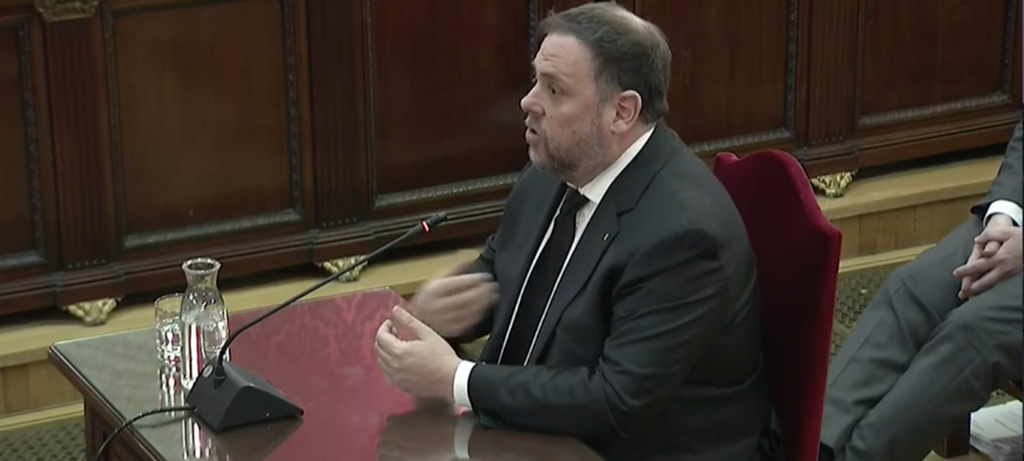14.02.2019 - 13:35
|
Actualització: 14.02.2019 - 14:35
“I see myself as a political prisoner,” was how the jailed former Catalan vice president Oriol Junqueras began his testimony in the Supreme Court on Thursday. “I’m convinced that I’m being accused for my ideas and not for my actions,” he added, as the trial of Catalan independence leaders continued in Madrid.
The third day of the trial of 12 politicians and activists charged over the 2017 independence bid came after defense teams and prosecutors laid out their arguments on the two previous days.
Oriol Junqueras is the most senior political figure to face trial in the Supreme Court. He was the Catalan vice president and the finance minister at the time of the referendum, as well as the main independence leader along with then-president Carles Puigdemont. While Puigdemont left the country following Madrid’s takeover of Catalan institutions, Junqueras stayed and was subsequently incarcerated on November 2, 2017 and has so far spent 469 days in custody.
Right to self-determination
In his testimony on Thursday, Junqueras remained defiant about organizing the independence referendum on October 1, 2017, which was declared illegal by the Spanish judiciary. “The right to self-determination has been applied on countless numbers of occasions, we will continue trying regardless of what happens here,” said the former vice president.
One of the most serious charges leveled at the leaders behind the independence bid is that they used violence to achieve their political goals. Yet, Junqueras forcefully denied the accusation: “Never, never, never. We’ve always rejected violence,” he said, adding that “a noble political goal can become immoral if you use incorrect mechanisms to achieve it.”
The former vice president also rejected the accusation that organizing the independence ballot can be considered an offense: “Nothing of what we did is a crime. Voting in a referendum is not a crime. Working for the independence of Catalonia is not a crime,” he insisted.
We need a political solution
Arguing that “this is not going to be solved by jailing people” Junqueras said “most Catalans agree: we need a political solution, which needs to be voted on, and the result must be respected.”
Junqueras also pointed to the refusal of the Spanish authorities to discuss the possibility of an agreed binding referendum on self-determination, saying “dialogue has always been denied. The chair opposite ours has always been empty.”
He also argued that the former government did nothing to hide its political objectives: “Any accusation that this was done with little transparency is not justified. Everything was public: the election manifestos, the parliamentary decisions, the votes…everything.”
At the end of his testimony, the former vice president added: “I love Spain, its people, language, and culture. How is this compatible with being a Catalan republican? The best way is to live together is to respect each other as equals.”


